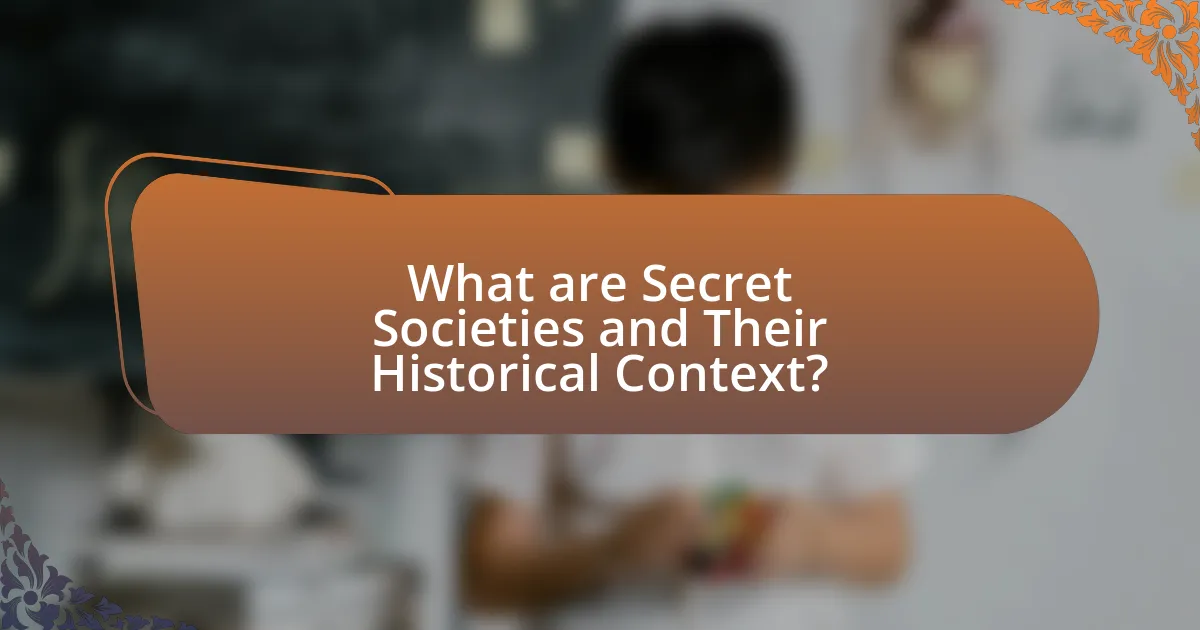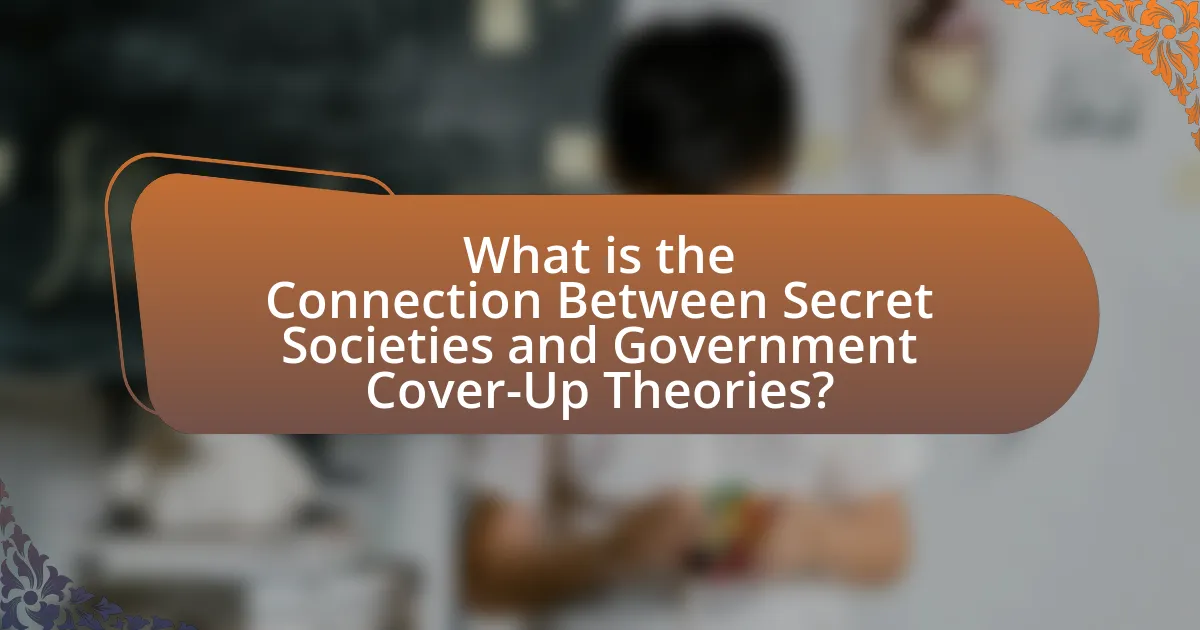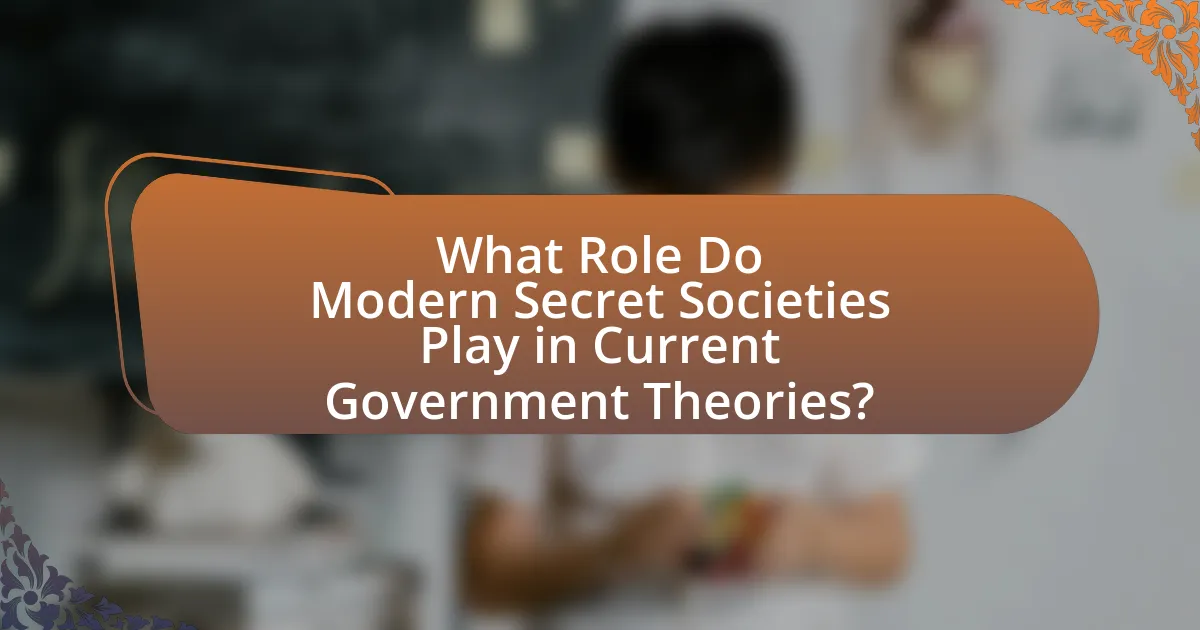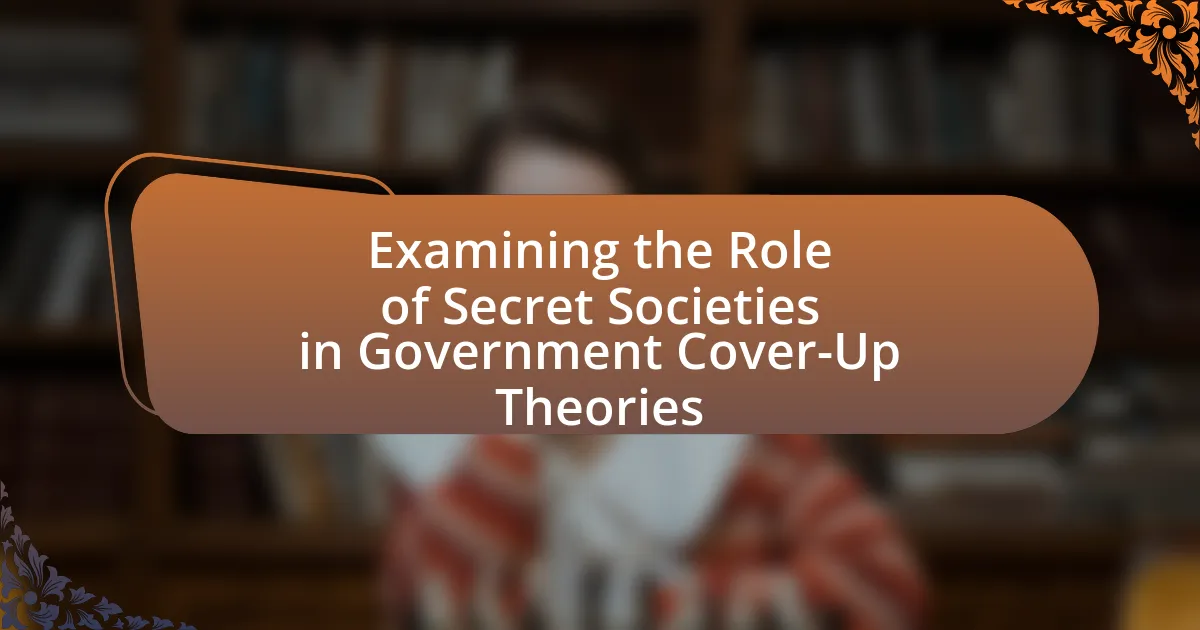Secret societies are clandestine organizations characterized by exclusive membership and secretive rituals, historically influencing political landscapes and societal norms. This article examines the historical context of secret societies, such as the Freemasons and the Illuminati, and their roles in significant political movements, including the American Revolution. It explores how these societies operate within governmental frameworks, their connection to conspiracy theories, and the psychological factors that contribute to belief in such theories. Additionally, the article discusses modern secret societies, their evolution, and the implications of believing in government cover-up theories related to these organizations, highlighting the impact on public trust and civic engagement.

What are Secret Societies and Their Historical Context?
Secret societies are organizations whose activities and inner workings are concealed from the public, often characterized by exclusive membership and secretive rituals. Historically, these societies have emerged in various cultures, such as the Freemasons in the 18th century, which promoted Enlightenment ideals, and the Illuminati, founded in 1776, aimed at promoting rationalism and secularism. Their historical context often involves political and social upheaval, where members sought to influence governance and societal norms discreetly, as seen during the French Revolution when secret societies played a role in revolutionary activities. The existence of these societies has fueled numerous conspiracy theories, particularly regarding their influence on government decisions and cover-ups, as they often operate outside of public scrutiny.
How have secret societies influenced political landscapes throughout history?
Secret societies have significantly influenced political landscapes throughout history by shaping ideologies, facilitating political movements, and impacting governance. For instance, the Freemasons played a crucial role in the American Revolution, promoting Enlightenment ideals that contributed to the founding of the United States. Their influence extended to key figures such as George Washington and Benjamin Franklin, who were members and advocated for democratic principles. Similarly, the Illuminati, founded in 1776, aimed to promote rationalism and secularism, influencing various revolutionary movements in Europe. Historical evidence shows that these societies often operated in secrecy, allowing them to maneuver politically without public scrutiny, which enabled them to affect policy decisions and political alignments.
What are some notable examples of secret societies in history?
Notable examples of secret societies in history include the Freemasons, the Illuminati, and the Skull and Bones. The Freemasons, founded in the late 16th to early 17th century, are known for their fraternal organization and influence in various political spheres, including the founding of the United States. The Illuminati, established in 1776 in Bavaria, aimed to promote Enlightenment ideals but has since been associated with numerous conspiracy theories regarding global control. Skull and Bones, founded in 1832 at Yale University, is recognized for its elite membership, including several U.S. presidents and influential figures, which has fueled speculation about its role in shaping American politics.
How did these societies operate within governmental frameworks?
Secret societies operated within governmental frameworks by influencing political decisions and shaping public policy through clandestine networks. These societies often comprised influential members from various sectors, including politics, business, and academia, allowing them to exert significant power behind the scenes. Historical examples include the Freemasons and the Illuminati, which were known to have members in key governmental positions, facilitating the promotion of their agendas. Research indicates that such societies utilized secrecy and exclusivity to maintain control and manipulate outcomes, as seen in the political machinations during the American Revolution, where Masonic lodges played a pivotal role in coordinating efforts among revolutionaries.
Why do secret societies attract conspiracy theories?
Secret societies attract conspiracy theories primarily due to their secretive nature and perceived influence over significant societal events. The lack of transparency surrounding these organizations fosters suspicion and speculation, leading individuals to theorize about hidden agendas and control over political or economic systems. Historical examples, such as the Freemasons and the Illuminati, illustrate how their clandestine operations have been linked to various conspiracy theories, often portraying them as puppeteers behind global events. This connection is further reinforced by the human tendency to seek explanations for complex phenomena, particularly when they involve power dynamics, thereby perpetuating the cycle of conspiracy theories surrounding secret societies.
What psychological factors contribute to belief in conspiracy theories?
Psychological factors contributing to belief in conspiracy theories include cognitive biases, social identity, and a need for control. Cognitive biases, such as the proportionality bias, lead individuals to perceive significant events as being caused by intentional actions rather than random occurrences. Social identity theory suggests that individuals align with groups that share their beliefs, reinforcing their conspiracy views. Additionally, a need for control and understanding in an unpredictable world drives people to seek explanations that fit their worldview, often resulting in the acceptance of conspiracy theories. Research by Goertzel (1994) found that individuals with higher levels of paranoia and lower trust in authority are more likely to endorse conspiracy beliefs, supporting the link between psychological factors and conspiracy theory acceptance.
How do secret societies serve as a focal point for these theories?
Secret societies serve as a focal point for government cover-up theories by embodying the secrecy and exclusivity that fuel public suspicion and speculation. Their clandestine nature allows for the proliferation of conspiracy theories, as individuals often perceive these groups as having hidden agendas that influence political and social outcomes. Historical examples, such as the Freemasons and the Illuminati, illustrate how these societies have been linked to significant events, leading to widespread belief in their involvement in orchestrating government actions behind closed doors. This perception is reinforced by the lack of transparency surrounding their activities, which creates a fertile ground for theories suggesting that they manipulate power structures and control information.

What is the Connection Between Secret Societies and Government Cover-Up Theories?
The connection between secret societies and government cover-up theories lies in the perception that secretive organizations influence political decisions and manipulate information. Secret societies, such as the Freemasons or the Illuminati, are often believed to operate behind the scenes, fostering distrust in governmental transparency. This distrust fuels conspiracy theories suggesting that these groups orchestrate cover-ups to conceal their agendas or maintain power. Historical examples, such as the Watergate scandal, illustrate how government actions can lead to speculation about hidden influences, reinforcing the belief that secret societies play a role in governmental deception.
How do secret societies allegedly facilitate government cover-ups?
Secret societies allegedly facilitate government cover-ups by providing a network of influential individuals who can manipulate information and maintain secrecy. These organizations often consist of members from various sectors, including politics, business, and the military, allowing them to exert significant control over public narratives. For instance, historical examples such as the Freemasons and the Skull and Bones society have been cited in conspiracy theories as having played roles in significant political events, suggesting that their members may collaborate to obscure truths or redirect public attention. This collaboration can create an environment where dissenting voices are silenced, and alternative explanations are dismissed, thereby enabling the government to manage perceptions and maintain power.
What types of cover-ups are commonly associated with secret societies?
Common types of cover-ups associated with secret societies include political manipulation, suppression of information, and involvement in illicit activities. Political manipulation often involves influencing government decisions or elections to favor specific agendas, as seen in historical instances like the alleged involvement of the Freemasons in political affairs during the American Revolution. Suppression of information can manifest in the concealment of scandals or controversial actions, such as the alleged cover-up of the true nature of the Bohemian Grove gatherings, where influential figures reportedly engage in secretive rituals. Additionally, involvement in illicit activities, such as drug trafficking or organized crime, has been attributed to various secret societies, with groups like the Skull and Bones being scrutinized for their connections to powerful elites and questionable dealings. These examples illustrate the multifaceted nature of cover-ups linked to secret societies.
How do these cover-ups impact public perception of government?
Government cover-ups significantly erode public trust in institutions. When citizens perceive that their government is concealing information, it fosters skepticism and suspicion regarding the motives and integrity of officials. Historical examples, such as the Watergate scandal, illustrate how revelations of cover-ups can lead to widespread disillusionment, resulting in decreased voter turnout and increased calls for transparency. According to a 2019 Pew Research Center survey, 70% of Americans believe that government officials are not honest, reflecting the long-term impact of such cover-ups on public perception.
What evidence supports the existence of government cover-ups involving secret societies?
Evidence supporting the existence of government cover-ups involving secret societies includes historical instances such as the Watergate scandal, where government officials conspired to conceal information, and the Church Committee investigations, which revealed covert operations by the CIA and other agencies. Additionally, documents like the Pentagon Papers exposed government deception regarding the Vietnam War, indicating a pattern of secrecy that aligns with claims of secret society involvement. Furthermore, testimonies from whistleblowers and declassified files have suggested connections between influential groups, such as the Freemasons and the Illuminati, and government actions that prioritize their interests over public transparency. These examples illustrate a recurring theme of governmental secrecy that fuels theories about the influence of secret societies.
What are some documented cases of alleged cover-ups?
Documented cases of alleged cover-ups include the Watergate scandal, where members of President Nixon’s administration attempted to conceal their involvement in a break-in at the Democratic National Committee headquarters, leading to Nixon’s resignation in 1974. Another case is the Iran-Contra affair, where the Reagan administration secretly facilitated arms sales to Iran to fund Contra rebels in Nicaragua, despite a congressional ban. The Tuskegee Syphilis Study is also notable; it involved the U.S. Public Health Service withholding treatment from African American men with syphilis to study the disease’s progression from 1932 to 1972. Each of these cases has been extensively documented and investigated, revealing significant governmental misconduct and attempts to obscure the truth.
How credible are the sources that report on these cover-ups?
The credibility of sources reporting on government cover-ups related to secret societies varies significantly. Established news organizations, academic journals, and investigative reports generally provide more reliable information due to their adherence to journalistic standards and fact-checking processes. For instance, investigations published in reputable outlets like The New York Times or The Guardian are often backed by thorough research and multiple sources, enhancing their credibility. Conversely, sources that rely on anecdotal evidence, conspiracy theories, or lack transparency in their reporting tend to be less credible. A study by the Pew Research Center indicates that public trust in media varies, with 62% of Americans expressing skepticism about the accuracy of news reports, particularly those involving controversial topics like government cover-ups. This skepticism underscores the need for critical evaluation of sources when assessing claims about secret societies and their influence on government actions.

What Role Do Modern Secret Societies Play in Current Government Theories?
Modern secret societies often serve as focal points in government theories, particularly in discussions surrounding conspiracy theories and perceived power dynamics. These organizations, such as the Freemasons or the Illuminati, are frequently cited as influential entities that allegedly manipulate political outcomes and societal structures behind the scenes. For instance, the belief that elite groups orchestrate global events is rooted in historical instances where secret societies have been linked to significant political movements, such as the American Revolution, where the Freemasons played a notable role. This connection fuels contemporary theories suggesting that such societies continue to exert covert influence over government policies and decisions, thereby shaping public perception and trust in governmental institutions.
How have modern secret societies evolved in their influence on government?
Modern secret societies have evolved to exert significant influence on government through increased networking, strategic lobbying, and the use of technology for communication and coordination. Historically, organizations like the Freemasons and Skull and Bones have shaped political landscapes by fostering connections among influential members in various sectors, including politics, business, and academia. For instance, the Bilderberg Group, founded in 1954, brings together elite leaders to discuss global issues, thereby impacting policy decisions indirectly. Additionally, the rise of digital platforms has allowed these societies to operate more covertly while expanding their reach and influence, as seen in the coordination of political movements and campaigns. This evolution reflects a shift from traditional, localized influence to a more global and interconnected approach, enabling modern secret societies to play a pivotal role in shaping governmental agendas and public policy.
What are some contemporary examples of secret societies in politics?
Contemporary examples of secret societies in politics include the Bohemian Grove and the Skull and Bones society. The Bohemian Grove, a private club in California, hosts influential political and business leaders annually, fostering a culture of secrecy around its activities. The Skull and Bones society, based at Yale University, has produced numerous prominent political figures, including U.S. Presidents and Senators, and is known for its clandestine rituals and exclusive membership. These societies are often cited in discussions about elite influence and government cover-up theories, as their secretive nature raises questions about transparency and accountability in political decision-making.
How do these modern societies differ from historical counterparts?
Modern societies differ from historical counterparts primarily in their access to information and communication technologies, which significantly influence transparency and public awareness. Unlike historical societies, where information was often controlled by a few elites, contemporary societies benefit from the internet and social media, enabling widespread dissemination of information and facilitating grassroots movements. For instance, the rise of platforms like Twitter and Facebook has allowed for real-time sharing of events and mobilization against perceived injustices, contrasting sharply with the limited communication channels of the past, such as print media and word of mouth. This shift has led to increased scrutiny of government actions and a greater demand for accountability, as seen in movements like the Arab Spring, where social media played a crucial role in organizing protests against authoritarian regimes.
What are the implications of believing in government cover-up theories related to secret societies?
Believing in government cover-up theories related to secret societies can lead to significant social and psychological implications. Individuals who subscribe to these theories may develop a pervasive distrust of governmental institutions, which can undermine civic engagement and participation in democratic processes. This distrust is often supported by historical instances, such as the Watergate scandal, where government misconduct was revealed, reinforcing the belief that authorities may conceal information. Furthermore, such beliefs can foster a sense of alienation and paranoia, as individuals may feel isolated in their views and perceive themselves as part of a minority that understands hidden truths. This can lead to the formation of echo chambers, where dissenting opinions are dismissed, further entrenching conspiracy beliefs and potentially resulting in social division.
How does belief in these theories affect civic engagement and trust in government?
Belief in government cover-up theories, particularly those involving secret societies, negatively affects civic engagement and trust in government. Individuals who subscribe to these theories often perceive the government as untrustworthy and manipulative, leading to increased skepticism about official narratives and a reluctance to participate in civic activities. Research indicates that when citizens believe in conspiracy theories, they are less likely to engage in voting or community initiatives, as they feel disillusioned and powerless. For instance, a study published in the journal “Political Psychology” found that belief in conspiracy theories correlates with lower levels of political participation and trust in democratic institutions. This dynamic creates a cycle where diminished trust leads to reduced civic engagement, further entrenching the belief in these theories.
What are the potential dangers of conspiracy thinking in society?
Conspiracy thinking poses significant dangers to society, including the erosion of trust in institutions, the spread of misinformation, and the potential for social division. When individuals embrace conspiracy theories, they often reject credible information and expert opinions, leading to a decline in public trust in government, media, and scientific communities. For instance, a study published in the journal “Psychological Science” found that belief in conspiracy theories can undermine public health efforts, as seen during the COVID-19 pandemic when misinformation about vaccines proliferated. Additionally, conspiracy thinking can foster polarization, as groups become entrenched in their beliefs, leading to increased hostility and conflict among different societal factions. This divisive environment can hinder constructive dialogue and collaboration, ultimately destabilizing social cohesion.
What practical steps can individuals take to critically assess claims about secret societies and government cover-ups?
Individuals can critically assess claims about secret societies and government cover-ups by employing a systematic approach that includes fact-checking, evaluating sources, and seeking expert opinions. First, individuals should verify the information by cross-referencing multiple reputable sources, such as academic journals or established news organizations, to ensure accuracy. For instance, the Pew Research Center provides data on public perceptions of government transparency, which can help contextualize claims.
Next, individuals should analyze the credibility of the sources presenting the claims, considering factors such as the author’s qualifications, the publication’s reputation, and the presence of citations or references to primary data. Additionally, engaging with experts in relevant fields, such as political science or sociology, can provide informed perspectives that challenge or support the claims being assessed.
Lastly, individuals should remain aware of cognitive biases, such as confirmation bias, which can distort their interpretation of information. By applying critical thinking skills and maintaining an objective stance, individuals can better navigate the complexities surrounding claims of secret societies and government cover-ups.
How can one differentiate between credible information and conspiracy theories?
To differentiate between credible information and conspiracy theories, one should evaluate the sources and evidence supporting the claims. Credible information typically comes from reputable sources, such as peer-reviewed journals, established news organizations, or experts in the field, and is backed by verifiable data or research. In contrast, conspiracy theories often rely on anecdotal evidence, lack of credible sources, and may involve unfounded assumptions or logical fallacies. For instance, a study published in the journal “Psychological Science” by Karen M. M. M. van Prooijen and others indicates that belief in conspiracy theories is often linked to a lack of trust in authorities and a desire for control, highlighting the psychological factors that can lead individuals to accept unverified claims over credible information.
What resources are available for further research on this topic?
Resources available for further research on the role of secret societies in government cover-up theories include academic journals, books, and online databases. Notable academic journals such as “The Journal of Political Ideologies” and “The Journal of Conspiracy Studies” publish peer-reviewed articles on related topics. Books like “Secret Societies and Their Power in the 20th Century” by Joseph P. Farrell and “The Secret History of the World” by Mark Booth provide in-depth analyses. Online databases such as JSTOR and Google Scholar offer access to a wide range of scholarly articles and papers that explore the intersection of secret societies and government actions. These resources collectively provide a comprehensive foundation for understanding the complexities of this topic.
